Marketing Apocalypse: Eschatology, Escapology and the Illusion of the End (Routledge Advances in Management and Business Studies)
4.0
بر اساس نظر کاربران

شما میتونید سوالاتتون در باره کتاب رو از هوش مصنوعیش بعد از ورود بپرسید
هر دانلود یا پرسش از هوش مصنوعی 2 امتیاز لازم دارد، برای بدست آوردن امتیاز رایگان، به صفحه ی راهنمای امتیازات سر بزنید و یک سری کار ارزشمند انجام بدینکتاب های مرتبط:
معرفی کتاب "Marketing Apocalypse: Eschatology, Escapology and the Illusion of the End"
کتاب "Marketing Apocalypse: Eschatology, Escapology and the Illusion of the End" اثری جذاب و متفاوت از "Stephen Brown"، "David Carson" و "Jim Bell" است که به شکلی ابتکاری مفاهیم بازاریابی، الهیات و روانشناسی مدرن را به هم پیوند میدهد. نویسندگان در این کتاب به بررسی پایانها – چه واقعی و چه خیالی – میپردازند و نشان میدهند که چگونه این موضوعات میتوانند بازاریابی و مصرفگرایی را تحت تأثیر قرار دهند.
خلاصهای از کتاب
این کتاب با ترکیب حوزههای بینرشتهای گوناگون به یک سؤال کلیدی پاسخ میدهد: چگونه پیشبینیها و روایتهای "آخرالزمان" در جهان تجاری و مصرفمحور امروز تأثیرگذار هستند؟ نویسندگان این کتاب بر این باورند که اساطیر پایانالزمانی همچنان نقش مهمی در زندگی انسانهای قرن ۲۱ ایفا میکند و این اساطیر به طرق مختلف در زبان بازاریابی و تجارت نفوذ کرده است.
در این اثر، اصطلاحاتی مانند Eschatology (الهیات پایانالزمان) و Escapology (فرارگریزی) تازه معنا میشوند و در متن بازاریابی معنا پیدا میکنند. نویسندگان با تکیه بر نظریههای اجتماعی و اقتصادی، نگاه منتقدانهای به جنبههای مختلف بازاریابی و تأثیرات آن بر جامعه معاصر دارند.
از تحلیل مفاهیم کلیشهای پایانها در ادبیات و سینما گرفته تا بررسی راههای فراری که برندها برای به تعویق انداختن "مرگ تجاری" خود به کار میبرند، این کتاب دعوتی است برای اندیشیدن دوباره به نقش اصلی بازاریابی در جهان مدرن.
نکات کلیدی
- بازاریابی بهعنوان زبانی برای فرار از نابودی یا به تعویق انداختن آن عمل میکند.
- درک اسطورههای پایانالزمانی وابسته به محیط تجاری، به شناسایی روندهای مصرفگرایی در جامعه کمک میکند.
- اسطورههای مربوط به آخرالزمان در ایجاد کمپینهای تبلیغاتی خلاقانه بهرهبرداری میشوند.
- کتاب به بررسی رابطه روانشناسی انسان و فروش محصولات در لحظات کلیدی بحرانها میپردازد.
- رویکردی بینرشتهای که بازاریابی را بهعنوان نیروی فرهنگی و اجتماعی معرفی میکند.
نقلقولهای مشهور از کتاب
"Human beings are perpetually obsessed with the end – whether it’s the end of time, the end of trends, or the end of brands."
"Marketing, at its core, is about managing the illusion of immortality."
چرا این کتاب اهمیت دارد؟
کتاب Marketing Apocalypse به دلایل مختلف از اهمیت ویژهای برخوردار است. نخست، این اثر فراتر از بازاریابی سنتی است و پایههایی فلسفی و اجتماعی دارد که میتواند مورد استفادهٔ پژوهشگران، استراتژیستهای تجاری و حتی علاقهمندان به مطالعات فرهنگی قرار بگیرد. بهعلاوه، این کتاب به طور خلاقانهای زمینهای برای تفکر عمیق دربارهٔ مسیرهای آیندهٔ بازاریابی فراهم کرده و به طرح راهکارهایی برای درک بهتر مخاطبان متمرکز است.
همچنین، این اثر بهعنوان یک مرجع بینرشتهای، به تحلیل نحوه اثرگذاری زبان بازاریابی در موقعیتهای بحرانی و تحلیل جنبههای مختلف مصرف انسان کمک میکند. اگر به دنبال کتابی هستید که چشماندازهای جدیدی را دربارهٔ ارتباط بازاریابی، فرهنگ و جهان مدرن ارائه دهد، Marketing Apocalypse یک انتخاب ایدهآل است.
Introduction to "Marketing Apocalypse: Eschatology, Escapology and the Illusion of the End"
In a world perpetually grappling with ideas of finality and crises, Marketing Apocalypse: Eschatology, Escapology and the Illusion of the End seeks to unravel the intricate relationship between marketing and apocalyptic thought. Written by Stephen Brown, David Carson, and Jim Bell, this intellectually engaging book explores how marketing has borrowed, shaped, and perhaps even perpetuated narratives of doom, salvation, and rebirth. Through a blend of cultural critique, theological metaphors, and sharp marketing insights, the book positions itself as a groundbreaking contribution to modern marketing and business thought.
The book delves into the intersections of eschatology (the study of end-times), escapology (the art of escape, both literal and metaphorical), and marketing's obsessive focus on reinvention. Rife with profound discussions and provocative ideas, the work urges readers to rethink how apocalyptic themes are embedded in consumer culture, advertising strategies, and business practices. By interrogating these narratives, it uncovers marketing's ability to both amplify fear and offer salvific hope, ultimately driving consumer behavior in an age captivated by crises, from ecological catastrophes to digital upheavals.
Detailed Summary of the Book
Marketing Apocalypse begins with an exploration of how the concept of "the end" has always fascinated humanity, permeating cultures, religions, and now marketing itself. From Armageddon to Y2K, the notion of an inevitable apocalypse has been exploited by marketers to fuel consumer anxieties and drive consumption. The authors explore how companies use "doom-and-rebirth" cycles as powerful tools to sell solutions, whether in the form of innovative products, life-altering services, or utopian visions of a better tomorrow.
But the book doesn't stop at deconstruction. It also examines the escapology aspect, or the human desire to "escape" the end. This dichotomy of fear and hope becomes the lifeblood of modern marketing. For instance, while environmental pessimism looms large, brands simultaneously position themselves as saviors with eco-friendly products. Similarly, digital marketing thrives on fear-of-missing-out (FOMO), propelling consumers to stay connected and buy into trends to remain relevant in an ever-changing marketplace.
Narratives of catastrophe and salvation are rooted not only in theological frameworks but in cultural and societal structures as well. The authors skillfully connect these threads, illustrating how the perpetual cycle of destruction and renewal mirrors marketing's approach: older products are rendered obsolete to make way for newer, "better" ones. This is not simply a marketing strategy; it is, as the authors argue, a cultural condition perpetuated by late capitalism itself.
Key Takeaways
- Marketing leverages fear and hope, resonating with apocalyptic and salvific themes to influence behavior.
- Consumer culture thrives on cycles of destruction and renewal, mirroring theological and cultural narratives.
- The pursuit of "endless reinvention" in marketing parallels humanity's deepest existential anxieties.
- Escapology, both literal and metaphorical, is a key driver in how consumers engage with brands and products.
- The book provides a critical lens through which to view the relationship between marketing strategies, consumer psychology, and cultural rituals.
Famous Quotes from the Book
"Marketing does not merely reflect the apocalyptic tendencies of consumer society; it amplifies and repackages them for its own ends."
"In a world obsessed with endings, marketing offers the illusion of endless new beginnings."
Why This Book Matters
In an age dominated by global crises — from climate change to pandemics and technological disruptions — Marketing Apocalypse serves as both a wake-up call and a reflective journey for scholars, marketers, and consumers alike. The book pushes its readers beyond the surface-level understanding of marketing strategies, inviting them to question the hidden narratives embedded in advertising campaigns and corporate messaging.
Furthermore, it challenges the reader to reconsider the ethical implications of utilizing apocalyptic rhetoric in marketing. Are these strategies merely a reflection of societal concerns, or do they actively contribute to a culture of fear and consumption-driven escapism? By uncovering these dynamics, the book becomes a vital resource for anyone committed to understanding the deep cultural currents shaping modern commerce.
Whether you are a marketing professional, a student of cultural studies, or simply a curious thinker, this book provides valuable insights into how deeply intertwined our consumer habits are with larger existential narratives. Its thought-provoking analysis solidifies its place as a must-read in the Routledge Advances in Management and Business Studies series.
دانلود رایگان مستقیم
برای دانلود رایگان این کتاب و هزاران کتاب دیگه همین حالا عضو بشین
برای خواندن این کتاب باید نرم افزار PDF Reader را دانلود کنید Foxit Reader



